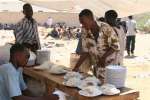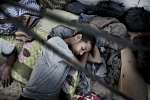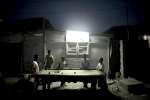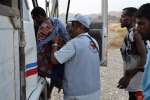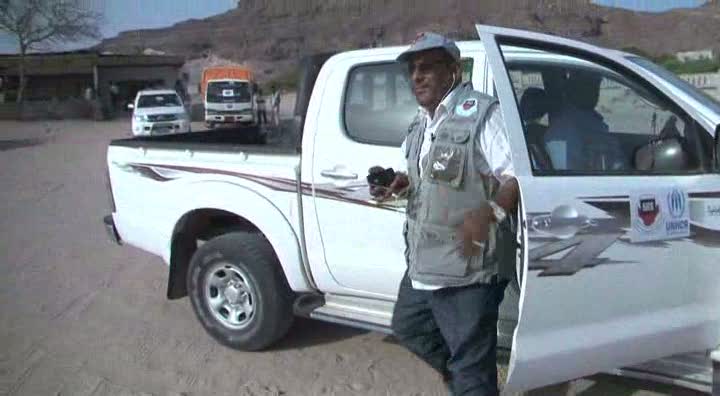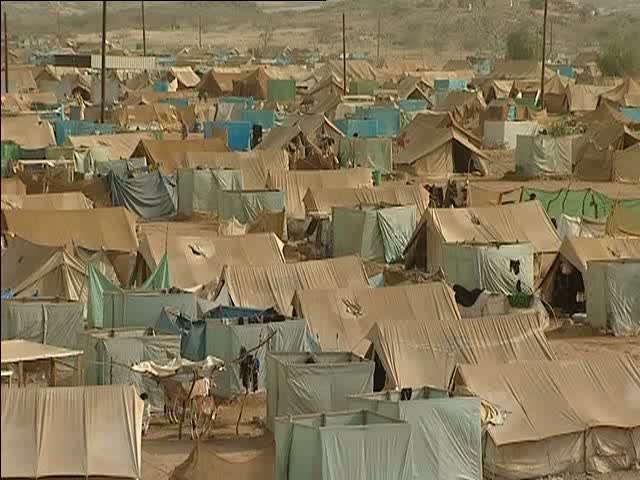Lone children fleeing war in Yemen, seek safety in Somaliland
News Stories, 11 January 2016
Hargeisa, Somaliland/Somalia, Jan 11 (UNHCR) – Yemeni teen Khayria Abdel Wahab was making the beds in the home where she was a housekeeper when a shattering blast signalled a heavy bombardment.
Panicked by the explosion, the 17-year-old ran out into the crowds fleeing towards the port in her hometown, all the while searching for her mother and her seven brothers and sisters. For three days, Abdel Wahab tried to find her family.
"I sat with strangers all desperately looking for someone," she says, remembering the moment in early November. "Mobile phones were not reachable, the network was down. Nobody could give me any hope."
She was warned that staying in Yemen was not safe. "I had no alternative," Abdel Wahab says. "I had to flee to Somalia."
The unaccompanied minor is among more than 168,000 people who have fled violence in Yemen since March, when years of political instability, economic hardship and sectarian tensions erupted into civil war. More than 9,500 of those who fled went to Somaliland, an autonomous region of Somalia across the Gulf of Aden from Yemen.
Most are Somalis and Ethiopians who first left Africa for Yemen but have been driven back across the seas by the fighting. But among them are more than 2,600 Yemenis, including at least 850 who registered with the UN Refugee Agency, UNHCR, alone or without their immediate family.
Many are unaccompanied people considered by UNHCR as vulnerable, including children like Abdel Wahab who became separated from their families, as well as older people, those with disabilities, or the sick.
Abdel Wahab paid a smuggler US$120 to take her on the 24-hour sea crossing to the Somali coast. As soon as she arrived, thugs stole her meagre funds and everything she had packed into her little suitcase. Abandoned, alone, and scared, she had no idea where to turn.
Eventually, fellow Yemenis found her and escorted her to the region's capital, Hargeisa. It is the custom to care for others from your clan, and Abdel Wahab was passed from one Yemeni refugee household to another, but each was worried about the costs of adopting her permanently. Finally, she arrived at Mohammed Aboubakr El Hindi's home.
"Before she came to stay, she had already been with two other families," says El Hindi, 57, also a refugee from Yemen. "It is imperative in our tradition for the clan to support the vulnerable. But given our dire hardships, we thought the best way to assist Khayria was to signal her case to humanitarian agencies."
UNHCR acted immediately. Abdel Wahab was registered as a refugee and taken to a women-only safe house where she was given her own room, counselling, food, and medical care. She is grateful, but deeply traumatised, and has still not been able to track down her mother or siblings.
"I am so scared of being alone, of the future, of not knowing what happened to my family in Yemen," she says. "I am entirely in the dark about what's next. My body and eyes are so tired of constant crying and sleepless nights. I am very young, but I fear this war might have destroyed my life for good".
During an average week, 60 cases of refugees who may require extra help are referred to UNHCR in Somaliland for a needs assessment, says Miriam Aertker, a protection officer with the organisation in Hargeisa. Since March 2015, 33 have been registered with serious medical conditions needing attention, 29 have reported being victims of sexual or gender-based violence, and 80 are children or young people who arrived without their parents.
"Even with a network of community service teams referring back to UNHCR and our partners immediately, some cases still escape us, particularly those who did not arrive to the main coastal cities where our reception centres are located," says Aertker.
"This means they were never briefed on the services we provide, and are therefore more exposed to vulnerabilities. Once they are in the cities, it is even harder identifying them amongst the refugee urban populations."
As well as the Yemenis, Somaliland hosts 9,000 Ethiopian refugees and asylum seekers, 2,900 Somalis who returned home after earlier fleeing their country, and 84,000 internally displaced. All need sustained help to rebuild their lives and settle among a community that already faces its own difficulties.
UNHCR and its partners continue to help vulnerable asylum seekers and refugees with emergency financial assistance, legal aid, psychosocial and health care programmes to help integrate them into host populations, and ways to earn a living. Sustained support to funding appeals is crucial to keeping this assistance going during 2016, Aertker says.
By Oualid Khelifi in Hargeisa, Somaliland/Somalia















